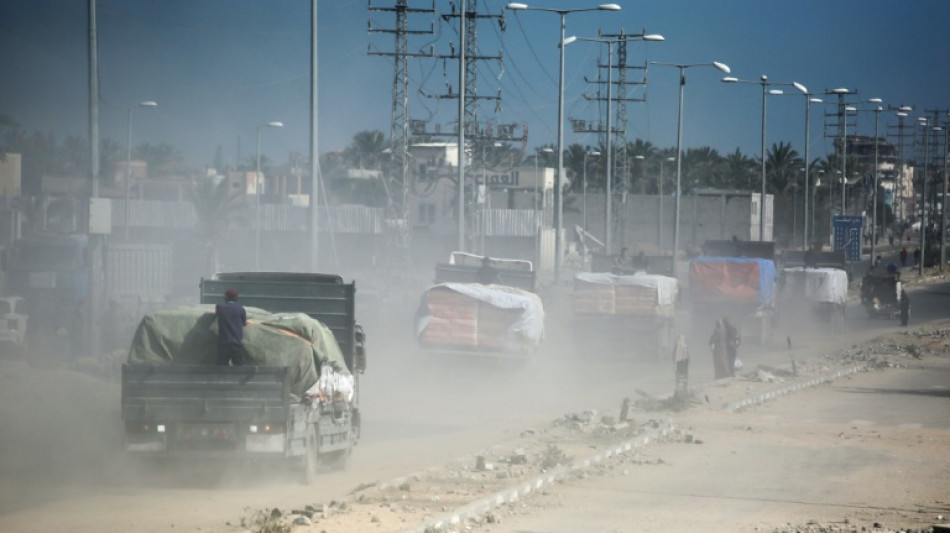
SCS
0.0200

Hamas said it will hand over the bodies of two hostages later on Saturday, after Israel warned that the main crossing from Egypt into Gaza would remain shut until the Palestinian group returns the remains of all deceased captives.
The UN relief chief meanwhile called for massive humanitarian support for the devastated Gaza Strip during a tour of the area.
Hamas's armed wing, the Ezzedine Al-Qassam Brigades, said on its Telegram channel that the group would "handover at 10:00 PM (1900 GMT) today the bodies of two Israeli captives, whose remains were recovered earlier today in the Gaza Strip".
Under a ceasefire deal brokered by US President Donald Trump, Hamas has so far released all 20 living hostages, along with the remains of nine Israelis and one Nepalese.
The most recent handover was on Friday night, that of the body identified by Israel as Eliyahu Margalit, who died aged 75 in Hamas's October 7, 2023 attack.
In exchange, Israel has released nearly 2,000 Palestinian prisoners and 135 other bodies of Palestinians since the truce came into effect on October 10.
The Palestinian mission in Cairo announced that the Rafah crossing between Gaza and Egypt could open as early as Monday, though only for Gazans living in Egypt who wished to return to the territory.
Shortly after, however, Prime Minister Benjamin Netanyahu's office said he had "directed that the Rafah crossing remain closed until further notice".
"Its reopening will be considered based on how Hamas fulfils its part in returning the hostages and the bodies of the deceased, and in implementing the agreed-upon framework," it said, referring to the week-old ceasefire deal.
Further delays to the reopening of Rafah could complicate the task facing Tom Fletcher, the UN head of humanitarian relief, who was in Gaza on Saturday.
The British diplomat and his team travelled in a convoy of SUVs to see a wastewater treatment plant in Sheikh Radwan, north of Gaza City.
"I drove through here seven to eight months ago when most of these buildings were still standing and, to see the devastation -- this is a vast part of the city, just a wasteland -- and it's absolutely devastating to see," he told AFP.
- Digging latrines -
Surveying the damaged pumping equipment and a lake of sewage at the Sheikh Radwan wastewater plant, Fletcher said the task ahead for the UN and aid agencies was a "massive, massive job".
He said he had met residents returning to destroyed homes who were trying to dig latrines in the ruins.
"They're telling me most of all they want dignity," he said. "We've got to get the power back on so we can start to get the sanitation system back in place.
"We have a massive 60-day plan now to surge in food, get a million meals out there a day, start to rebuild the health sector, bring in tents for the winter, get hundreds of thousands of kids back into school."
The Rafah crossing has yet to reopen but, just over a week since the brokering of the truce, hundreds of trucks are rolling in each day via Israeli checkpoints and aid is being distributed.
According to figures supplied to mediators by the Israeli military's civil affairs agency and released by the UN humanitarian office, on Thursday some 950 trucks carrying aid and commercial supplies crossed into Gaza from Israel.
Relief agencies have called for the Rafah border crossing to be reopened to speed the flow of food, fuel and medicines, and Turkey has a team of rescue specialists waiting at the border to help find hostage bodies in the rubble.
- 'What did they do wrong? -
Some violent has persisted despite the ceasefire.
Gaza's civil defence agency, which operates under Hamas authority, said on Saturday that it had recovered the bodies of nine Palestinians -- two men, three women and four children -- from the Shaaban family after Israeli troops fired two tank shells at a bus.
Two more victims were blown apart in the blast and their remains have yet to be recovered, it said.
At Gaza City's Al-Ahli Hospital, the victims were laid out in white shrouds as their relatives mourned.
"My daughter, her children and her husband; my son, his children and his wife were killed. What did they do wrong?" demanded grandmother Umm Mohammed Shaaban. "They were little... What did they do wrong? There is no truce."
The military said it had fired on a vehicle that approached the so-called "yellow line", to which its forces withdrew under the terms of the ceasefire, and gave no estimate of casualties
"The troops fired warning shots toward the suspicious vehicle, but the vehicle continued to approach the troops in a way that caused an imminent threat to them," the military said.
"The troops opened fire to remove the threat, in accordance with the agreement."
burs-dc-jd/spm/dcp
O.Ruzicka--TPP